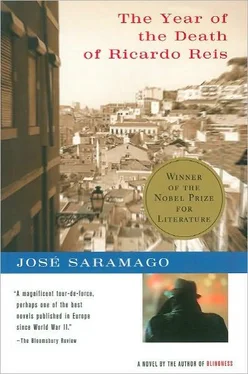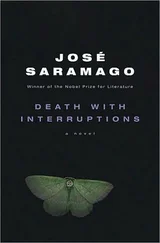José Saramago - Year of the Death of Ricardo Reis
Здесь есть возможность читать онлайн «José Saramago - Year of the Death of Ricardo Reis» весь текст электронной книги совершенно бесплатно (целиком полную версию без сокращений). В некоторых случаях можно слушать аудио, скачать через торрент в формате fb2 и присутствует краткое содержание. Год выпуска: 1992, ISBN: 1992, Издательство: Houghton Mifflin Harcourt, Жанр: Современная проза, на английском языке. Описание произведения, (предисловие) а так же отзывы посетителей доступны на портале библиотеки ЛибКат.
- Название:Year of the Death of Ricardo Reis
- Автор:
- Издательство:Houghton Mifflin Harcourt
- Жанр:
- Год:1992
- ISBN:9780547546926
- Рейтинг книги:4 / 5. Голосов: 1
-
Избранное:Добавить в избранное
- Отзывы:
-
Ваша оценка:
- 80
- 1
- 2
- 3
- 4
- 5
Year of the Death of Ricardo Reis: краткое содержание, описание и аннотация
Предлагаем к чтению аннотацию, описание, краткое содержание или предисловие (зависит от того, что написал сам автор книги «Year of the Death of Ricardo Reis»). Если вы не нашли необходимую информацию о книге — напишите в комментариях, мы постараемся отыскать её.
Year of the Death of Ricardo Reis — читать онлайн бесплатно полную книгу (весь текст) целиком
Ниже представлен текст книги, разбитый по страницам. Система сохранения места последней прочитанной страницы, позволяет с удобством читать онлайн бесплатно книгу «Year of the Death of Ricardo Reis», без необходимости каждый раз заново искать на чём Вы остановились. Поставьте закладку, и сможете в любой момент перейти на страницу, на которой закончили чтение.
Интервал:
Закладка:
The manager Salvador was at his post, stationary, beaming his perennial smile. Ricardo Reis greeted him and walked on, but Salvador pursued him, wanting to know if the doctor would like to have a drink before dinner, an apéritif. No, thank you, this was another habit Ricardo Reis had not acquired, perhaps in years to come, first the taste, then the need, but not just yet. Salvador lingered for a moment in the doorway to see if the guest might change his mind or make some other request, but Ricardo Reis had already opened one of the newspapers. That entire day he had spent in ignorance of what was happening in the world. Not that he was an assiduous reader by nature, on the contrary, he found those large pages and verbose articles tiresome, but here, having nothing better to do and in order to avoid being fussed over by Salvador, he made the paper with all its news from abroad serve as a shield against this more immediate and encroaching world. The news of the distant world can be read as insignificant dispatches whose use and destination are questionable. The Spanish Government has resigned, the dissolution of Parliament has been decreed, says one headline. The Negus, in a telegram to the League of Nations, claims that the Italians are using asphyxiating gases. How typical of newspapers, all they can talk about is what has already happened and nearly always when it is much too late to rectify mistakes, prevent shortages, or avert disasters. A worthwhile paper should tell you, on the first day of January in the year nineteen fourteen, that war will break out on the twenty-fourth of July, then we would have almost seven months at our disposal to ward off the threat. Perhaps that would be enough time. Better still if a list were published of those about to die. The millions of men and women who, as they drink their morning coffee, come upon the announcement of their own deaths, their destinies sealed and shortly to be fulfilled, the day, hour, and place, their names printed in full. What would they have done, what would Fernando Pessoa have done if he had read two months beforehand, The author of Mensagem will die on the thirtieth of next November from hepatitis. Perhaps he would have consulted a doctor and stopped drinking, or else he would have started drinking twice as much in order to die sooner. Ricardo Reis lowers the newspaper to look at himself in the mirror, a reflection that is twice deceiving because it shows a deep space then shows that the space is a mere surface where nothing actually happens, only the illusion, external and silent, of persons and things, a tree overhanging a lake, a face seeking itself, a face undisturbed, unaltered, not even touched, by the images of tree and lake and face. The mirror, this one and all others, is independent of man. Before it we are like a conscript departing for the nineteen-fourteen war. Admiring his uniform in the mirror, he sees something more than himself, not knowing that he will never see himself again in this mirror. We are vanity and cannot endure, but the mirror endures, the same, because it rejects us. Ricardo Reis averts his eyes, changes position, leaves, he the one rejecting, turning his back on the mirror. Perhaps, then, he too is a mirror.
The clock on the landing struck eight, and the last echo had scarcely died away when an invisible gong rang out in muted tones. It can only be heard in the immediate vicinity, the guests on the upper floors certainly cannot hear it. But one must bear in mind the weight of tradition, it is not just a matter of pretending that wine bottles are encased in wickerwork when wicker is no longer available. Ricardo Reis folds the newspaper, goes to his room to wash his hands and tidy up. Returning immediately, he sits at the table where he has eaten from his very first day here and waits. Anyone watching him, following those rapid footsteps, would think that he must be either famished or in a great hurry, had an early lunch and eaten little or else bought a ticket for the theater. But we know otherwise, he didn't have an early lunch, we also know that he is not going to the theater or the cinema, and in weather such as this, becoming steadily worse, only a fool or an eccentric would dream of going for a walk. Why, then, the sudden haste, if people are only just arriving for dinner, the thin man in mourning, the placid fat man with the excellent digestion, those others whom I did not see last night. The mute children and their parents are missing, perhaps they were only passing through. As of tomorrow I shall not enter the dining room before half past eight. Here I am as ridiculous as any bumpkin newly arrived in the city and staying for the first time in a hotel. He ate his soup slowly, idly playing with his spoon, then toyed with the fish on his plate, pecked at it, not feeling the least bit hungry. As the waiter was serving the main course, the maître d' guided three men to the table where, the evening before, the girl with the paralyzed hand and her father had dined. So she won't be coming, they've left, he thought, or are dining out. Only then did he admit what he already knew but had pretended not to, that he had really come down early to see the girl whose left hand is paralyzed and who strokes it as if it were a little lap dog, even though it does nothing for her, or perhaps for that reason. Why. The question is a pretense, in the first place because certain questions are posed simply to call attention to the absence of any reply, in the second place because there is something both true and false about the possibility that his interest does not require any deeper explanation. He cut short his dinner and ordered coffee and a brandy. He would wait in the lounge, one way of killing time until he could ask the manager Salvador who those people were. That father and daughter, you know I believe I've seen them before, elsewhere, perhaps in Rio de Janeiro, certainly not in Portugal, that is obvious because sixteen years ago the girl would have been a mere child. Ricardo Reis spins and weaves this web of overtures, so much inquiring to discover so little. Meanwhile Salvador is attending to other guests, one who is leaving early tomorrow morning and wishes to settle his bill, another who complains that he cannot sleep when the window shade starts banging. Salvador attends to all the guests with tact and solicitude, with his discolored teeth and smooth mustache. The thin man dressed in mourning came into the lounge to consult a newspaper and left almost immediately. The fat man appeared at the door biting a toothpick, hesitated when confronted with a blank stare from Ricardo Reis, then quickly withdrew, his shoulders drooping from lack of courage. Some retreats are like this, moments of extreme moral weakness which are difficult to explain, especially to oneself.
Half an hour later the affable Salvador is able to inform him, No, you must have mistaken them for someone else, as far as I know they have never visited Brazil, they've been coming here for the last three years, we have often chatted and they would almost certainly have told me about such a voyage. Ah, so I was mistaken, but you say they have been coming here for the last three years. That's right, they are from Coimbra, they live there, the father is Doctor Sampaio, a lawyer. And the girl. She has an unusual name, she is called Marcenda, would you believe it, but they belong to an aristocratic family, the mother died some years ago. What is wrong with her hand. I believe her whole arm is paralyzed, that's why they come to stay here in the hotel for three days every month, so that she can be examined by a specialist. Ah, every month for three days. Yes, three days every month, Doctor Sampaio always warns me in advance so that I can keep the same two rooms free. Has there been any improvement during the last three years. If you want my frank opinion, Doctor, I don't think so. What a pity, the girl is so young. That's true, Doctor, perhaps you could offer them some advice next time, if you are still here. It's most likely I shall be here, but in any event I am not specialized in that field, I practice general medicine, I did some research into tropical diseases but nothing that would be helpful in a case like hers. Never mind, but it's very true that money doesn't bring happiness, the father so rich and the daughter a cripple, no one has ever seen her smile. You say she's called Marcenda. Yes, sir. A strange name, I've never come across it before. Nor I. Until tomorrow, Senhor Salvador, Until tomorrow, Doctor.
Читать дальшеИнтервал:
Закладка:
Похожие книги на «Year of the Death of Ricardo Reis»
Представляем Вашему вниманию похожие книги на «Year of the Death of Ricardo Reis» списком для выбора. Мы отобрали схожую по названию и смыслу литературу в надежде предоставить читателям больше вариантов отыскать новые, интересные, ещё непрочитанные произведения.
Обсуждение, отзывы о книге «Year of the Death of Ricardo Reis» и просто собственные мнения читателей. Оставьте ваши комментарии, напишите, что Вы думаете о произведении, его смысле или главных героях. Укажите что конкретно понравилось, а что нет, и почему Вы так считаете.












